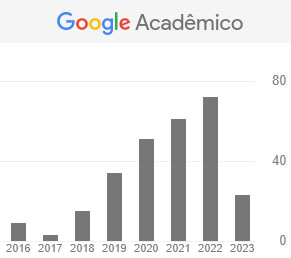Probability from a digital perspective: an analysis of videos published at the Festival of Digital Videos and Mathematics Education
DOI:
https://doi.org/10.5965/2357724X12222024e0105Keywords:
mathematics education, digital technologies, digital videos festival, probabilityAbstract
In this study we analyzed two videos published at the Festival of Digital Videos and Mathematics Education (FVDEM), with an emphasis on the probabilistic concepts presented. In addition to analyzing these videos, the objective was to investigate the impact of FVDEM as a platform to promote Mathematics Education, recognizing videos as valuable teaching tools. Using a qualitative approach, the videos were analyzed as examples of how Digital Technologies (DT) can promote student autonomy and deepen learning. It is crucial to highlight the importance of the interaction between human beings and digital media in the creation and dissemination of knowledge, highlighting the active role of videos in this process. Thus, the Digital Video Festival not only contributes to students' understanding of probability, but also empowers them as participatory agents in the construction of mathematical knowledge, demonstrating the transformative potential of DT in Mathematics Education. This approach emphasizes the relevance of videos as dynamic and accessible teaching tools, capable of engaging students and promoting a deeper understanding of mathematical and statistical concepts.
Downloads
References
ARAÚJO, J. L.; BORBA, M. C. Construindo pesquisas coletivamente em educação matemática. In: BORBA, M. C.; ARAÚJO, J. L. (org.). Pesquisa qualitativa em educação matemática. Belo Horizonte: Autêntica, 2004. p. 27-47.
ARAÚJO, P. C.; IGLIORI, S. B. O problema epistemológico da probabilidade. Caderno da Física da UEFS, Feira de Santana, v. 11, n. 12, p. 57-75, 2013. Disponível em:http://dfis.uefs.br/caderno/vol11n12/Artigo05PericlesProbabilidade.pdf. Acesso em: 30 ago. 2024.
AZEVEDO, N. C. S. de, Monica; FURKOTTER, M.; LIMA, C. M. de. Cultura digital e oficina de informática na educação integral: aplicação do software “Virtual Dj Free”. Interfaces Científicas-Educação, Aracajú, v. 8, n. 3, p. 441-454, 2020.
BIAJOTI, E. D. Experimentos probabilísticos: noções de probabilidade no ensino fundamental II. 2013. Dissertação (Mestrado em Matemática) – UFSCar, São Carlos, 2013.
BORBA, M. C. The future of mathematics education since COVID-19: Humans-with-media or humans-with-non-living-things. Educational Studies in Mathematics, [S. l.],v. 108, n. 1, p. 385-400, 2021.
BORBA, M. C. A pesquisa qualitativa em educação matemática. In: REUNIÃO ANUAL DA ANPED, 27., 2004, Caxambu. Anais [...]. Caxambu, 2004. p. 1-18.
BORBA, M. C.; SOUTO, D. L. P.; JUNIOR, N. R. C. Vídeos na educação matemática: Paulo Freire e a quinta fase das tecnologias digitais. Belo Horizonte: Autêntica Editora, 2022.
BORBA, M. C.; NEVES, L. X.; DOMINGUES, N. S. A atuação docente na quarta fase das tecnologias digitais: produção de vídeos como ação colaborativa nas aulas de matemática. EM TEIA-Revista de Educação Matemática e Tecnológica Iberoamericana, Recife, v. 9, n. 2, p. 1-24, 2018.
BORBA, M. C.; VILLARREAL, M. E. Humans-with-media and the reorganization of mathematical thinking: information and communication technologies, modeling, visualization and experimentation. New York: Springer, 2005.
BORBA, M. C. et al. Humans-with-media: twenty-five years of a theoretical construct in mathematics education. In: HANDBOOK OF DIGITAL RESOURCES IN MATHEMATICS EDUCATION. Cham: Springer International Publishing, 2024. p. 191-216.
CAZORLA, I. M.; KATAOKA, V. Y.; SILVA, C. B. Trajetórias e perspectivas da educação estatística no Brasil: um olhar a partir do GT12. In: LOPES, C. E.; COUTINHO, C. Q. S.; ALMOULOUD, S. A. (org.). Estudos e reflexões em educação estatística. 1. ed. Campinas: Mercado de Letras, 2010. p. 19-44.
LOPES, C. E.; SOUZA, L. de O. Aspectos filosóficos, psicológicos e políticos no estudo da probabilidade e da estatística na educação básica. Educação Matemática Pesquisa, São Paulo, v. 18, n. 3, p. 1465-1489, 2017.
MALTEMPI, M. V.; FIGUEIREDO, O. DE A. Reflexões sobre o uso de tecnologias digitais na pesquisa qualitativa. In: SEMINÁRIO INTERNACIONAL DE PESQUISA E ESTUDOS QUALITATIVOS, 5., 2018, Foz do Iguaçu. Anais [...]. Foz do Iguaçu, 2018. p. 1-8.
BUSSAB, W. DE O.; MORETTIN, P. A. Estatística básica. In: BUSSAB, W. DE O.; MORETTIN, P. A. estatística básica. São Paulo: Saraiva, 2010. 540p.
SILVA, P. V.; CARMO, J. V. C. Educação estatística e software rstudio: perspectivas na educação matemática. In: SITEM - SIMPÓSIO INTERNACIONAL DE TECNOLOGIAS EM EDUCAÇÃO MATEMÁTICA, 4., 2023, Rio Claro. Anais [...]. Rio Claro: UNESP/IGCE, 2023. Disponível em: https//www.even3.com.br/anais/sitem2023/659533-EDUCACAO-ESTATISTICA-E-SOFTWARE- RSTUDIO--PERSPECTIVAS-NA-EDUCACAO-MATEMATICA. Acesso em: 15 mar. 2024
SILVA, J. F.; CURI, E.; SCHIMIGUEL, J. Um cenário sobre a pesquisa em educação estatística no boletim de educação matemática – BOLEMA, de 2006 até 2015. Bolema - Boletim de Educação Matemática, Rio Claro, v. 31, n. 58, p. 679-698, ago. 2017.
Downloads
Published
How to Cite
Issue
Section
License
Copyright (c) 2024 Revista BOEM

This work is licensed under a Creative Commons Attribution-NonCommercial-NoDerivatives 4.0 International License.
Declaração de Direito Autoral
Os artigos publicados pela Revista BOEM são de uso gratuito, destinados a aplicações acadêmicas e não comerciais. As/os leitoras/es são livres para transferir, imprimir e utilizar os artigos publicados na Revista BOEM, desde que sempre haja menção explícita ao/s autor/es e à BOEM e que não haja qualquer alteração no trabalho original.
Todos os direitos autorais são atribuídos à revista BOEM. Ao submeter um artigo à Revista BOEM e tê-lo aprovado, as/os autoras/es concordam em ceder, sem remuneração, os direitos autorais à revista BOEM e a permissão para que a revista BOEM redistribua esse artigo e seus metadados aos serviços de indexação e referência que seus editores julguem apropriados.
Os artigos cujos autores são identificados representam a expressão do ponto de vista de seus autores e não a posição oficial da Revista BOEM.
O BOEM adota a licença Creative Commons - Atribuição-Não Comercial-Sem Derivações 4.0 Internacional.




